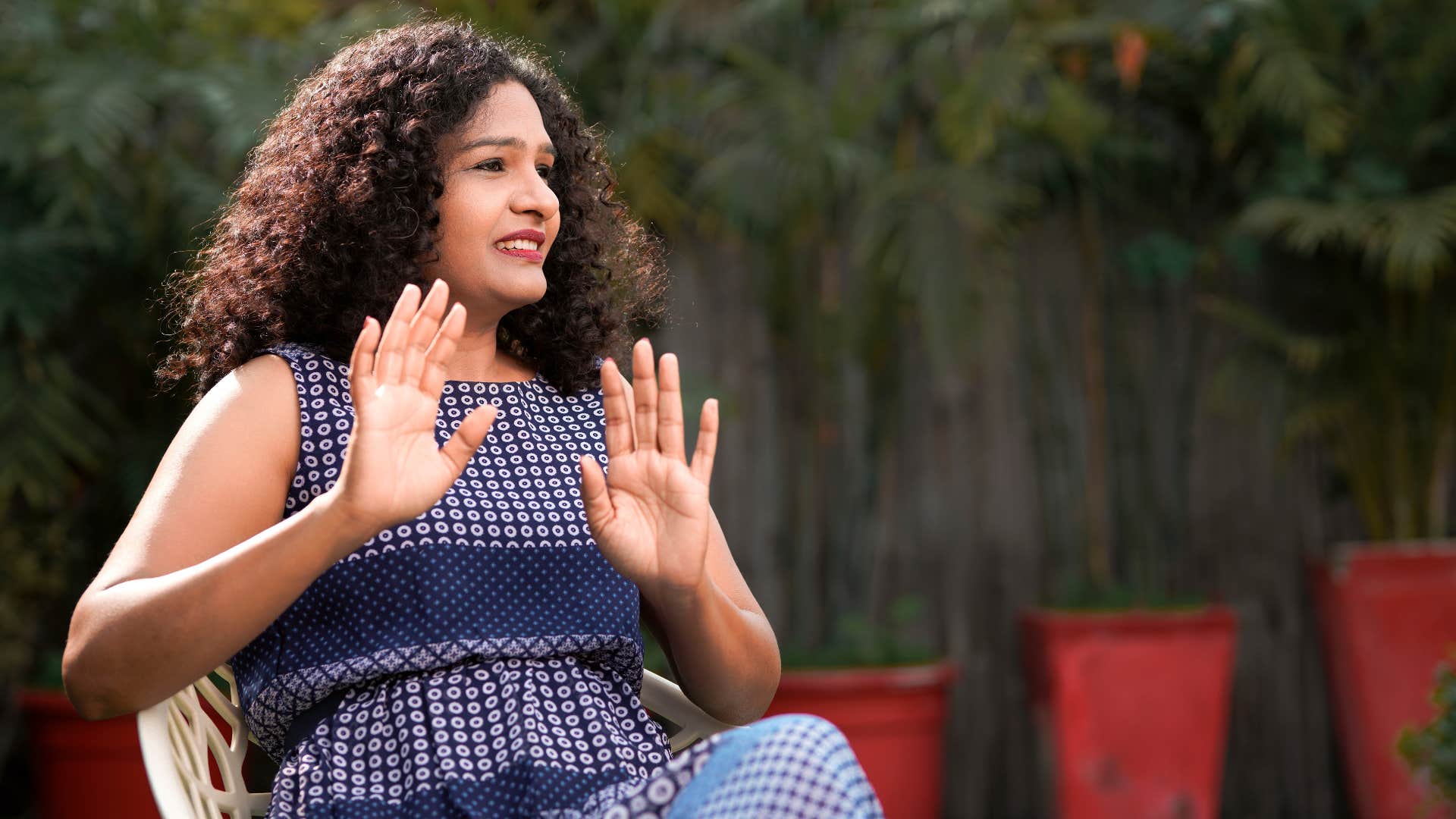People Who Can’t Stand Close Talkers And Hugs Usually Have These 11 Reasons
If someone's dodging hugs, it's probably has nothing to do with you.
 fizkes / Shutterstock
fizkes / Shutterstock There are three types of people in this world: those who are overly affectionate, those who tolerate affection, and those who run away from any form of affection. While the average person is often placed somewhere in the middle, people who can't stand close talkers and hugs usually have these reasons that have nothing to do with anyone else.
Of course, it's never fun to extend yourself for a hug or get close to someone in a conversation only to see them shift away. However, people who genuinely hate affection and, by extension, close talkers and hugs, have valid reasons that have to do with their own internal way of being.
People who can't stand close talkers and hugs usually have these 11 reasons
1. They value personal space
 simona pilolla 2 | Shutterstock
simona pilolla 2 | Shutterstock
People who can't stand close talkers and hugs usually value personal space. Sorry, but they aren't quick to hug people they don't know. Sure, it might be awkward, especially if they are brought up in a culture where hugging and standing close are normal. Still, they don't want to disrespect their own boundaries, which is why they're quick to back away and offer a firm handshake instead.
It's nothing personal, but honoring one's boundaries is important. Whether that means taking a step back or removing themselves from the situation completely, honoring one's comfort levels is necessary in everyday life.
As licensed psychologist Jordan Fiorillo Scotti, Ph.D., explained, "Setting and holding boundaries is the best way to create a life we don't need to escape from." So, even if it's uncomfortable, don't be afraid to say no. While it's awkward at first, respecting oneself leads to greater happiness and better interactions with others.
2. They have sensory sensitivities
 StoryTime | Shutterstock
StoryTime | Shutterstock
Some people get overwhelmed easily. Almost every sound and touch can set them on edge, especially if they're already overwhelmed. This is why people who can't stand close talkers and hugs usually hate it. While others may not understand, their heightened sensitivity makes them more uncomfortable with their surroundings.
That being said, it is up to them to ground themselves. Even if they're feeling overwhelmed, learning to take a step back and revisit a conversation is extremely important. As well as learning to establish boundaries and say, "Hey, I'm feeling a bit overwhelmed, give me a second," is also important.
While most people don't want to cross anyone else's boundaries or make someone uncomfortable, not establishing those boundaries can make the conversation even more unbearable.
3. It’s not part of their cultural norms
 PeopleImages | Shutterstock
PeopleImages | Shutterstock
While some struggle with hugs because of personal boundaries, others don't do hugs at all. Due to their upbringing, they aren't used to affection or close contact. So, if someone can't stand close talkers and hugs, it could be because these behaviors are not part of their cultural norms. While it may seem unusual to avoid a hug in America, in some countries, hugging and being close to one another are relatively uncommon.
As Lower Columbia College explained, "Greetings vary across cultures, and what feels natural in one country can be completely unexpected, or even awkward, in another."
So, while it's easy to get offended at those who don't hug back or inch away the closer someone gets, don't always take it too seriously. Sure, it's a bit rude to some. However, learning to understand and accept each other's differences is always important.
4. They are introverted
 Arthur Bargan | Shutterstock
Arthur Bargan | Shutterstock
It's tempting to overthink someone's body language. After being dodged and treated like they hate you, it's normal for someone to think, "Did I do something wrong?" And while they may secretly harbor ill feelings towards you, sometimes, people who can't stand close talkers and hugs usually are introverted. If someone is avoiding everyone's hugs and is keeping to themselves, chances are they're an introvert.
No, introverts aren't trying to upset everyone. In an ideal world, they could overcome their reservations and 'act normal.' However, everyone has boundaries, and what works for one person may not always work for another. This is why introverts keep things to a minimum and, for the most part, keep to themselves. Not trying to step on toes, an introvert does their best to exit out of a conversation so they don't have to awkwardly shuffle away from a close talker.
5. They get anxious or socially nervous
 fizkes | Shutterstock
fizkes | Shutterstock
While introverts may become slightly uncomfortable during social interactions, people who dislike close talkers and hugs often experience anxiety or social nervousness. They don't know why, but whenever someone approaches them, they can't help but freeze up. Yes, they know the polite thing to do would be to endure and fake a smile. However, if someone isn't familiar with the other person, it isn't uncommon to feel a bit nervous.
This is especially true as more people become isolated from one another. As licensed psychotherapist Nan J. Wise, Ph.D., explained, "Unfortunately, too many people have a limited circle of real-life, in-person connection — and this fuels the freeze response."
So, if someone is frozen and looks uncomfortable during a hug or if you're too close, try to move away. While these individuals should learn to express their thoughts and boundaries, helping them along the way is always welcome.
6. They don’t like feeling restricted or trapped
 Nicoleta lonescu | Shutterstock
Nicoleta lonescu | Shutterstock
It may sound dramatic, but some people truly dislike hugs and closeness because they make them feel trapped. Blame it on their anxiety or the overstimulation happening, but creating distance helps them feel more in charge of themselves and their environment. Of course, it is a bit awkward when someone dodges affection without explanation. However, if they aren't upset and seem relatively normal, it may just be them expressing their comfort levels.
That being said, there are other ways to show affection without getting too close. For some, going in with a handshake instead of a hug might be their safest bet. That way, they can make everyone feel comfortable, regardless of the situation. Yet, if someone isn't sure, it's always better to be safe than sorry.
Try to respect people's space and, if necessary, ask them, "Sorry, am I making you uncomfortable?" That way, they aren't blindly guessing or reading too much into things.
7. They want to avoid mixed signals
 NIKS ADS | Shutterstock
NIKS ADS | Shutterstock
For the average person, hugging and standing close to someone doesn't mean much. Body language isn't always straightforward, and what means something to one person doesn't always mean the same to another. Even if it seems platonic, some people can get the wrong idea, which is why people who dislike close talkers and hugs often want to avoid sending mixed signals.
From making their partner feel comfortable to ensuring that the other person doesn't get the wrong idea, wanting to avoid mixed signals by creating distance isn't anything new. According to Professor of Leadership and Organizational Psychology Ronald E. Riggio, Ph.D., "Subtle, nonverbal cues can have a big impact on how we perceive and evaluate others." This is unfortunate, as many of us engage in body language that we don't even know could be taken the wrong way.
So, while some may call it dramatic, letting someone know your intentions by creating space is the best way to communicate, "Hey, I'm not interested," without needing to say it out loud.
8. They are sensitive to other people’s energies
 fizkes | Shutterstock
fizkes | Shutterstock
For those who are spiritual, they probably know what it is to be sensitive to people's energies. Without someone needing to say a word, they can pick up on their mood, causing them to react because of it inadvertently. As most people can imagine, this is pretty draining. Always being on the fence, people who can't stand close talkers and hugs usually have a tendency to be sensitive to people's energy.
And while they can push themselves to hug them or ignore their closeness, being too close to someone with draining energy can be, well, draining. This is why they're quick to cut a conversation short and go running. While it's a bit rude, it's the only way people with this gift can protect their energy.
9. They don’t like being startled or approached suddenly
 Antonio Guillem | Shutterstock
Antonio Guillem | Shutterstock
If someone doesn't know a person that well, it's always better to keep a respectful distance. Even if others are hugging and being affectionate towards one another, what works for one person may not work for the next. This is why people who can't stand close talkers and hugs usually don't like being startled or approached suddenly. It might seem normal for the other person, but those who hate affection might not be used to it.
Barely hugging their parents, they'll probably feel a bit startled if someone random hugs them out of nowhere. This is especially true if that person stands too close to them while talking. As Professor Emerita of Psychological and Brain Sciences, Susan Krauss Whitbourne, PhD, ABPP, explained, "People can also get very territorial about their personal space." So, to avoid accidentally setting them off, always go in for a handshake. That way, they can ensure they're remaining courteous to those around them.
10. They’re sensitive to smells
 AYO Production | Shutterstock
AYO Production | Shutterstock
They aren't trying to be rude by backing away from a hug. They can't help themselves. People who can't stand close talkers and hugs are often sensitive to smells. Now, it's not to say that everyone smells bad. Yet, if someone does happen to have body odor, people who are sensitive to smells will have a hard time standing close to them. From feeling nauseous to feeling trapped, they need to escape.
This is why some people hurry along a conversation or look like they're barely breathing while talking to others. While it may not be the person in front of them that smells bad, something in their environment is off, causing them to want to get away as soon as possible.
11. They prefer subtle affection
 JLco Julia Amaral | Shutterstock
JLco Julia Amaral | Shutterstock
Finally, people who can't stand close talkers and hugs usually prefer subtle affection. It's nothing personal, but maybe hugs are a bit too much for a person. For some, they may only give hugs to those whom they trust or know well. This is why they prefer to substitute affection with something a bit more subtle. From backing away while talking and choosing to high-five instead of hug, these individuals find creative ways to make everyone feel comfortable.
As American psychologist Mark Travers, Ph.D., explained, "The fifty-fifty rule for compromise is less about equal contributions and more about finding balance, empathy, and fairness over time." So, even if it requires a bit of sacrifice on their part, they'd rather make a compromise and have both people win than be too rude and completely ignore someone's gesture of affection.
Marielisa Reyes is a writer with a bachelor's degree in psychology who covers self-help, relationships, career, family, and astrology topics.

